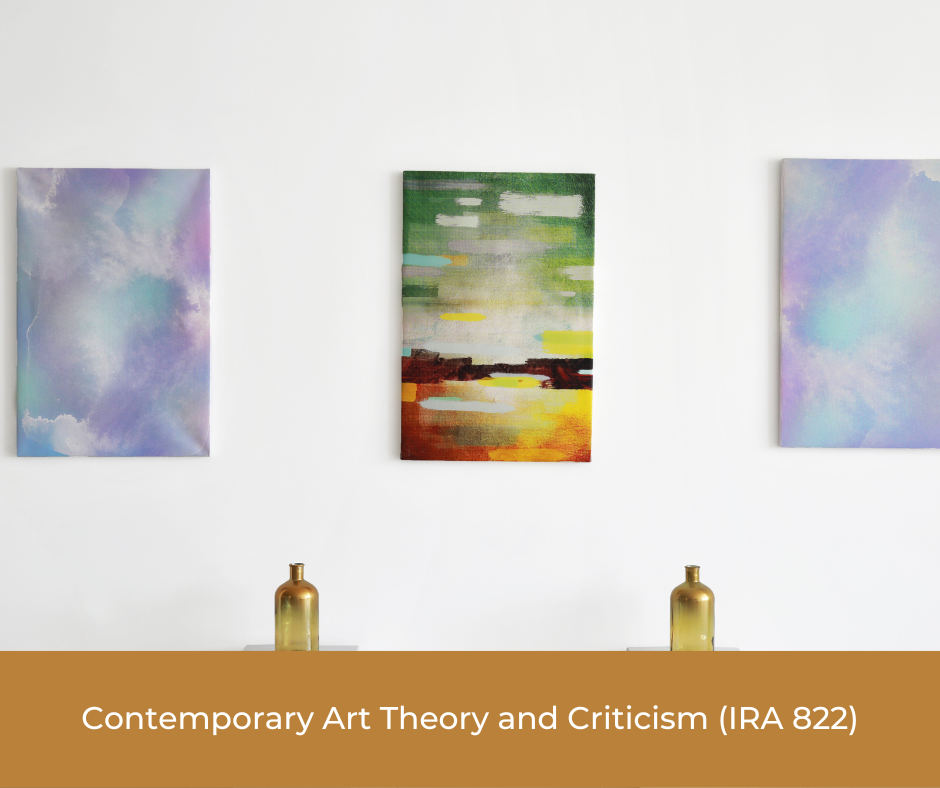Course Description: The Contemporary Art Theory and Criticism course offers an in-depth exploration of advanced theories and critical perspectives in contemporary art. Students will engage with critical debates, analyze art within a broader cultural context, and delve into the evolving paradigms of art theory. This course provides a platform for students to critically examine and appreciate contemporary art in a thoughtful and informed manner.
Outline of Major Content Areas:
- Postmodernism and Beyond:
- A comprehensive exploration of postmodern art theories and their influence on contemporary art.
- Understanding how postmodernism has shaped contemporary art’s characteristics and philosophies.
- Critical Approaches to Visual Arts:
- Examining various critical approaches and methodologies used to analyze contemporary visual art.
- Learning to apply critical lenses to artworks, including formal, contextual, and socio-political perspectives.
- Contemporary Art in a Global Context:
- Investigating contemporary art’s global landscape, with a focus on transnational movements and artists.
- Analyzing how cultural, geographical, and political factors influence contemporary art practices.
- Art Criticism and Its Evolution:
- Tracing the historical evolution of art criticism and its contemporary manifestations.
- Evaluating the role of art critics, institutions, and publications in shaping the discourse around contemporary art.
- Practical Projects:
- Engaging in critical writing and discussion about contemporary art.
- Developing the ability to write insightful critical essays and actively participate in discussions about the significance of contemporary art.
Course Learning Outcomes:
Upon successful completion of this course, students will:
- Comprehensive Understanding: Demonstrate a comprehensive understanding of postmodernism and its influence on contemporary art, recognizing the major tenets and characteristics of postmodern art.
- Critical Analysis Skills: Develop critical analysis skills to assess and interpret contemporary art from diverse perspectives, including formal, contextual, and socio-political lenses.
- Global Art Awareness: Gain an awareness of contemporary art in a global context, including the impact of cultural, geographical, and political factors on artistic practices.
- Art Critique Proficiency: Acquire proficiency in art critique and the ability to engage in in-depth discussions about contemporary art, its cultural significance, and its critical reception.
- Critical Writing Skills: Enhance critical writing skills to produce well-reasoned and well-informed critical essays that contribute to the discourse surrounding contemporary art.
Methods for Assessing Student Learning:
Student learning will be assessed through a variety of methods to evaluate their comprehension and critical engagement with contemporary art theory and criticism:
- Critical Essays: Assignments that require students to write critical essays analyzing specific artworks or themes within contemporary art.
- Class Participation: Assessment of students’ active participation in class discussions and debates about critical issues in contemporary art.
- Group Discussions and Seminars: Evaluation of students’ contributions and discussions in group seminars and discussions focused on course topics.
- Final Project or Presentation: A comprehensive final project or presentation that allows students to demonstrate their understanding of contemporary art theory and criticism.
- Quizzes and Exams: Periodic quizzes and exams to assess students’ knowledge of key concepts and critical perspectives covered in the course.
By the end of this course, students will not only possess a profound understanding of contemporary art theory and criticism but also the skills and confidence to critically engage with and contribute to the evolving discourse surrounding contemporary art.
